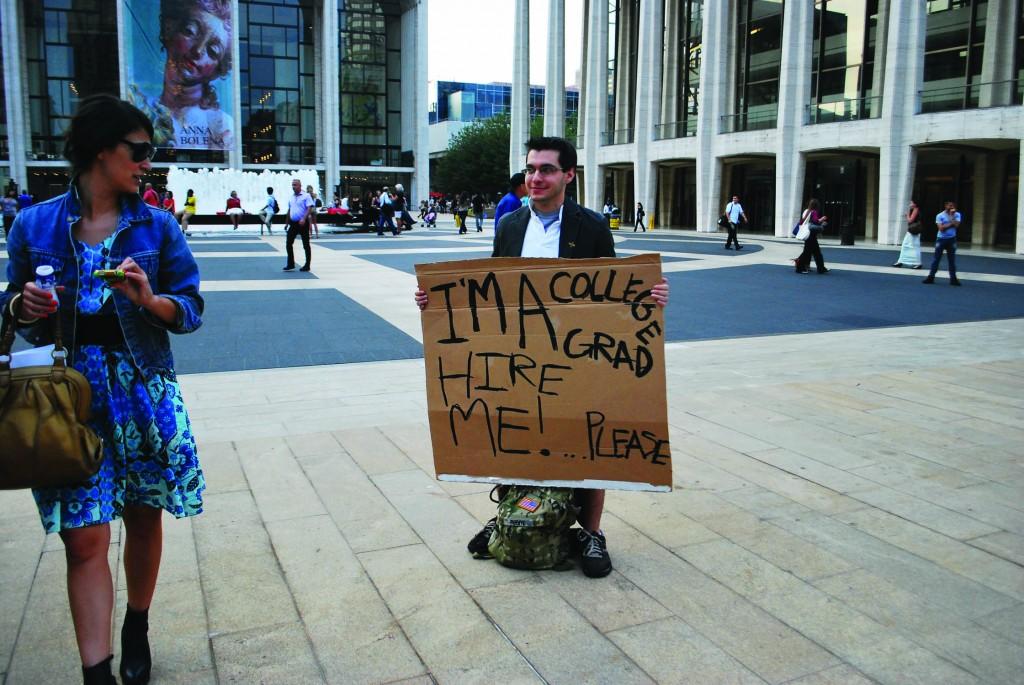The Economy Adds Zero Jobs: College Students Must Defy the Odds
September 21, 2011

For some of us, this is the last year at Fordham. We’ve started to think about graduation and the hunt for jobs. This is a time when even those who are not interested in economics take a look at articles about unemployment. Since the beginning of the Great Recession, graduating college students have had difficulties finding jobs.
Some have chosen to explore artistic experiences unrelated to their degree, thinking they could just wait out the economic crisis – The New York Times (NYT) dubbed them “Generation Limbo.” This belief greatly underestimates both the severity of the present economic situation as well as how easy it will be for someone to find a job in their original field after a few years of doing unrelated work. In order to make good decisions about our future, it is important to understand the extent of the problem and what, if anything, we can do to prepare ourselves.
According to the Bureau of Labor Statistics (BLS), the economy added zero jobs during the month of August. That’s a depressing statistic when, according to NYT, the U.S. economy needs to add 150,000 jobs per month just to keep up with population growth. Over the past three months then, we ran a deficit of 345,000 jobs just because the economy didn’t keep up with new entrants into the labor market (high school and college graduates, primarily). It’s difficult to grasp just how long it will take, even if the economy fully recovered tomorrow, to make up for all these losses.
In addition, the percentage of people over 55 who remain in the work force has been steadily increasing. Their retirement would help younger workers move up in their careers and recent graduates to find entry-level jobs.
With such a bleak job situation, you’d think the government would be spending money to keep people employed, but it’s not. Local governments have shed over half a million jobs in the past three years. That leaves the federal government. Yet the government seems to do the opposite of what good sense (and Keynesian economics) suggests.
Instead of cutting spending and firing people, the government should expand spending. There are plenty of infrastructures like road and bridges that need to be maintained, and major cities (including New York) could use subsidies that help pay for mass transit improvements. Most of the jobs will likely be in construction and manufacturing. However, as the economy improves, college-educated workers will be more in demand again: investors will look for the next big thing, which requires innovative and versatile workers.
It thus appears that there is little being done by the state, and employers have little reason to hire additional workers if there isn’t enough demand for their products as it is. Consequently, short of electing politicians with a basic grasp of economics next year, the only option available to you is to make yourself a very attractive employee.
In order to be attractive, don’t become part of “Generation Limbo.” Be active and network. A job is unlikely to find you on its own. Instead, use Fordham’s career fairs and hand your resume to prospective employers. Even if the job isn’t exactly what you want to do, it might provide you with a way into your desired industry. You also have time to do an internship or two before you graduate: a good way to form connections and gain some experience.
Pay attention to detail. An employer might get a hundred applications for a single opening. At that point, it’s all about finding reasons NOT to hire someone. Typographical errors, inconsistent formatting or verbosity can all be detrimental.
Keep your resume to one page, get feedback on it from Career Services and friends, include your GPA if it is a 3.0 or higher and make sure the formatting is consistent. An employer might spend as little as 30 seconds reviewing a resume – is that enough to get the important facts about you? In this economy it’s up to you to stand out and show why you should be hired over all the others.
If there is a glimmer of hope, then it surely is that even if the economy loses jobs, there are always people being hired. A negative number merely means that more people retired (or were laid off) than were hired nationally – something that is not necessarily indicative of the employment situation in New York, for example.
Now’s the time to look for jobs aggressively and not to sit back and relax, thinking something will come along on its own. Employers can afford to be very picky about who they hire, therefore you cannot be picky about which job you apply for. In times like this, how you present yourself to employers becomes more important than ever. The job situation may be bleak, but your attitude doesn’t have to be.











